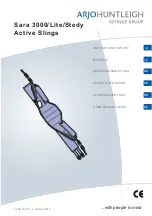
12
General Maintenance & Care
Maintenance Recommendations
Routine maintenance will extend the quality and life of Shor-Line products.
It is the owners responsibility to set-up scheduled maintenance programs, depending on
use of the equipment. Scheduled preventive maintenance should include, but not limited
to daily or weekly inspections and maintenance of products to prolong its longevity and
to help maintain proper product functions.
• Follow manufacturers cleaning and maintenance recommendations outlined in product literature
provided for components not included in these recommendations. Configurations/component parts
may vary.
• Check alignment of operable panels, doors and components to ensure operation is free of
obstructions. Adjust as required.
• Check any battery compartments to ensure the batteries are not failing, corroding the
contacts or damaging the equipment. A pencil eraser can be used to clean electrical contacts
in battery compartments.
• Check any wiring for kinks or exposed inner wiring. If damage exist, stop equipment use and
contact Shor-Line Technical Services for direction.
•
Check any hydraulic lift components for leaking fluid. If fluid is present, stop equipment use and
contact Shor-Line Technical Services for direction. Do NOT attempt to repair hydraulic leaks.
Care Recommendations
Routine product care will extend the quality and life of Shor-Line products and aids in
protecting animals from transmittable diseases and infections.
It is the owners responsibility to set-up scheduled cleaning programs, depending on
use of the equipment. Scheduled preventive cleaning should include, but not limited to
daily or weekly inspections and cleaning of products to prolong its longevity and to help
maintain finishes.
Safe Cleaning Practices
•
Use the mildest cleaning procedure that will complete the job effectively. Ordinary waste deposits
and fluids can usually be removed with soap and water, using a soft cloth or sponge. Rinse
thoroughly with clear water and dry completely with a soft cloth to discourage hard-water spotting.
• Minor scale build up and some hard water spotting can be removed by washing with a vinegar
diluted mixture followed by a clear water rinse and thorough drying.
• Bleach, deodorizing agents, disinfectants, and sanitizers can corrode stainless steel, thoroughly
rinse all surfaces treated with these chemicals with a clear water rinse and dry with a soft cloth.
•
If scrubbing is required, use only polymer or nylon fiber products made for use with polymer or
nylon materials.
• Always rinse with clear water and dry of all surfaces treated with cleaning, sterilization solutions.
Unsafe Cleaning Practices (NOT Recommended)
• Do NOT use a dry cloth or wipe clear polymer surfaces which can scratch if dust/dirt is wiped with
the hand or dry cloth.
• Polymer materials can discolor if exposed to sunlight, ultraviolet rays. Avoid direct sun exposure.
• Do NOT use ammonia or bleaches to clean polymer surfaces.
•
Do NOT allow fluids to accumulate, puddle without removing and completely drying the
surfaces and components. Standing water/fluids are a hazard and can cause damage to
component materials.
•
Do NOT use scouring powders that will scratch polymer finishes.
Steel wool or steel brushes should never be used to clean stainless steel or polymer
surfaces, avoid abrasive cleaning techniques/supplies.




































